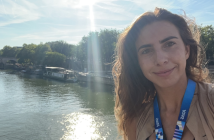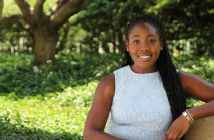This year’s spring orientation program for first-year students focused on programming around anti-racism and diversity, equity, and inclusion (DEI) issues. Held on January 19, 2021, the orientation builds on last year’s spring orientation program, the first ever offered at Fordham Law.
“To succeed in the legal profession–both in terms of building a career and in terms of fulfilling the responsibilities of the profession–you need much more than the ability to analyze a judicial decision or to parse a statute,” said Dean Matthew Diller to students during his opening remarks. “You need to be able to understand the human problems people bring to you and what is important to them; to understand the outlook, values and goals of the other players. Only this kind of broader outlook can enable you to craft effective strategies and keep long term objectives, as well as short term goals, in mind.”
Invited guests included Michelle Silverthorn, who led a diversity plenary session focused on law schools and the legal profession, and experts from Fletcher Consulting, who organized anti-racism workshops based on the first year law school experience for eight sections of students. Additional programming included elective sessions featuring over 20 legal professionals in various practice areas focused on DEI matters. Through these interactive and practice-specific sessions, students were able to understand the legal perspectives surrounding physical and learning disabilities, DEI in law firms and in-house counsel departments, and careers in social justice and civil rights.
Furthering the commitment Fordham Law made in June 2020 to address structural racism in its own community and to combat racism in society more generally, the spring orientation provided students with valuable resources and a forum for transformative conversation that goes beyond the classroom setting and will be applicable upon entering the legal profession.
“This component layers additional information, but also focuses on the relevance of this discussion to law students and the legal profession,” said Assistant Dean of Student Affairs and Diversity Kimathi Gordon-Somers, “while connecting the discussion to leadership and development.”
“The idea is to inform the students through this discussion what type of lawyer they should aspire to be by integrating these important aspects of DEI into their profession,” he added.
To plan for the orientation, Kamille Dean, director of DEI, engaged students in a series of meetings to identify key issues. Those discussions—in addition to conversations with upper-level students who previously went through the orientation training—helped reshape the day’s sessions.
Embracing DEI in Big Law
In the “Diversity, Equity, and Inclusion in Big Law” session, a panel of lawyers shared their perspectives on a number of different aspects of DEI—from navigating law school as a diverse student to becoming a first-generation attorney in big law to climbing the corporate ladder. Diversity—as Kassem L. Lucas, partner at Troutman Pepper, noted—not only encompasses ethnicity and race, but gender, LGBT, disabilities, and veterans as well.
For students struggling with anxiety and imposter syndrome, Mohammed Farooqui, associate at Arent Fox, recommended repeating self-affirmations. Farooqui said he found that constantly reminding himself that he deserved to be sitting next to his classmates built up confidence and chipped away at what can be an intimidating academic environment, especially for first generation students.
Tanya L. Martinez-Gallinucci, fifth-year litigation associate at Cleary Gottlieb, emphasized the importance of seeking out multiple mentors. “You want some mentors to be windows and others to be mirrors. You want to be able to look out and see the path through someone that maybe you wouldn’t have otherwise seen, and you want to be able to see yourself in some of your mentors,” Martinez-Gallinucci said, noting that mentors can later serve as sponsors of your work. “The combination of those things will help get you [far]along.”
Jennifer H. Wu, partner at Paul, Weiss, Rifkind, Wharton & Garrison, reflected on how walking her own path helped her excel as an attorney. Having learned English as a second language at a young age, Wu said she has used her keen eye for reading body language to her advantage in the courtroom.
Navigating Bias in the Legal Field
The legal profession remains one of the least diverse professions in the U.S., according to the American Bar Association. Dru Levasseur, director of diversity, equity, and inclusion at the National LGBT Bar Association, moderated the discussion titled “LGBTQ+: Advocacy and Allyship in Law School and the Legal Profession.” Panelists included Susan D. Landrum, assistant dean of academic success and professionalism at Nova Southeastern University Shepard Broad College of Law; Juan Carlos Matos, assistant vice president for student affairs for diversity and inclusion and assistant dean and director for multicultural affairs at Fordham University; and Nila Merola, in-house corporate counsel at Aspen Dental Management.
To help break down structural barriers often found within the legal field, the speakers encouraged students to find allies within their spaces and for allies to make themselves visible. Landrum suggested adding pronouns in your email signature and attending classmates’ LGBTQ+ group meetings as ways to show support.
Through a Fordham-specific lens, Matos outlined how the campuses at Lincoln Center and Rose Hill have worked toward greater inclusivity during the past few years. He mentioned how Fordham now has all-gender bathrooms and implemented the Chosen First Name Policy in the fall of 2020.
Merola also spoke about how more and more law firms are allocating resources to active affinity groups, as well welcoming and encouraging associates and partners to do pro bono work in support of the LGBTQ community. This, Merola noted, has been a step in the right direction, though he said there are still “miles and miles to go.”
Advocating for Oneself
Three attorneys shared their experiences and advice when navigating the legal space with a disability during the “Understanding Legal Perspectives Surrounding Physical and Learning Disabilities in the Legal Profession” panel discussion.
As an attorney and ally for the disabled community, Colleen Parker, adjunct professor and assistant director of career development at St. John’s Law, noted that disabilities are not always visible. They also include learning disabilities and mental health issues. She noted that society needs to continue to recognize individuals’ different abilities and embrace them as values.
Melissa Kubit Angelides, adjunct professor and assistant director of career development at St. John’s University School of Law, and Joseph DeJesus, associate at Cleary, Gottlieb, Steen & Hamilton, spoke to the importance of advocating for themselves—including requesting and receiving suitable accommodations for their respective disabilities. They also emphasized how individuals are the best judge of their own needs to be comfortable and succeed in their environments.
“It is so important that we change the attitude and the perception that having a disability makes someone less than, and that we help employers recognize the value added in bringing on a diverse candidate,” Angelides said.
DeJesus, in a similar vein, offered a personal perspective: “The lessons I’ve learned through navigating law school and the practice of law with a visual disability is that it’s an ongoing conversation. It’s not something that’s a ‘one and done, I have this and this is what I need.’ Sometimes it takes multiple conversations and reminding people over time of what it’s like to be in your situation. … But, most importantly, I would say hard work can overcome any obstacle, and it can overcome any initial impression that an individual may have of you.”
Another panel dedicated to discussing diversity, equity and inclusion within in-house counsel and corporate law departments was also offered. Panelists included: Juan Gonzalez, senior vice president, assistant general counsel, intellectual property at Mastercard International; Linda Lin, senior vice president, general counsel at QBE North America; Rosevelie Marquez Morales, D&I director for the Americas at Hogan Lovells; and Grissel Seijo, counsel, employment law and D&I officer at RBI.
The final elective panel students could attend was titled “Diversity, Equity and Inclusion in Social Justice and Civil Rights Careers.” Panelists included: Tracey Brown, managing partner at The Cochran Firm; Celina Cában Gandhi, staff attorney with Manhattan Legal Services’ Family Law Unit; and Afaf Nasher, executive director for the New York chapter of the Council on American Islamic Relations (“CAIR-NY”).
Moving Forward
Building on the success of spring orientation, the Law School is planning additional programming to engage students in a continuing conversation around anti-racism and DEI issues.
“The goal of the orientation program was to provide our students with the knowledge and skills to navigate today’s legal landscape and to improve diversity and inclusion at Fordham Law and in the legal profession,” said Gordon-Somers. “It is more evident that, in our profession, diversity and inclusion responsibilities must be a shared responsibility, and as a result, we will continue to strive to do more to prepare our students, as future lawyers, to think about and engage in ways to improve diversity and inclusion in the legal profession.”




